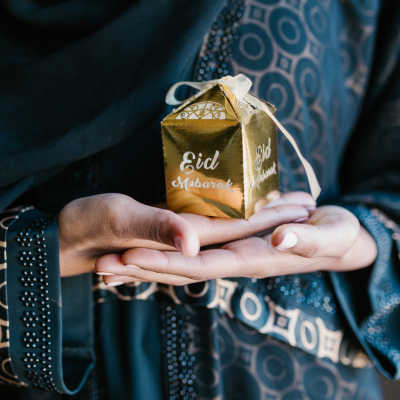
This article was written by Maryum Khwaja, LCSW, Issra Killawi, BA and Tariq Elsaid, MSW candidate. It was reviewed by Dr. Madiha Tahseen, Ph.D.
Sign Up For More Resources Here
6 Tips To Support Someone Who Is Grieving This Eid
Along with the joy of being with the people we love, the holidays may also remind us of who we’ve lost. A holiday can bring on a fresh wave of grief after the passing of a loved one–even many years later. The difficult emotions we thought we had dealt with begin to resurface. And when everyone else is celebrating, the grief can feel even more heavy than usual.

Image Credit: Psychology Tools
Here Are 4 Ways That Grief May Show Up This Eid And Advice On How To Move Through It:
Feeling Guilty
As Eid approaches, you might feel some excitement about celebrating – then immediately shut down your excitement. Feeling anything other than sadness means that you’ve forgotten your loved one, or that you’re moving on without them…right? You hold onto the feelings of sadness to remember the person you’ve lost, and you feel guilty for experiencing any other emotion, like being happy.
For better or for worse, grief won’t go away because you “forget” to feel it. It will always remain a part of you – but you learn to grow beyond it. Think of grief as a circle inside of you. When you first experience a loss, it overwhelms you. But with time, you begin to grow around the circle of grief inside of you. It will become more bearable. You’ll be able to experience other emotions and feelings, like excitement before Eid or stress at work.

Image Credit: What’s Your Grief
On the other hand, you might feel guilty for being sad on Eid, especially if it’s been a while since the passing of your loved one. You should be over it by now, right? Maybe you’ve been told that feeling sad for “too long” is a sign of low Iman (faith in Allah) and that you need to accept His will. (This is called spiritual bypassing. Learn about why it can be harmful to your healing.) Yes, the loss of your loved one is God’s will, but it also hurts – and that’s okay. Death is described as a Fitnah (a trial or difficulty) for a reason – because it’s difficult to experience. It’s okay to feel sad about losing someone even many years after their passing. If you’re struggling to make sense of your loss on a spiritual level, it’s important not to ignore this. Find support from a religious figure who you know and trust. Share your thoughts with them. Ask yourself, “What can I learn about my Creator and about myself through this experience?” These resources may help too.
- Understanding Affliction and Allah’s Love | Yaqeen Institute
- He Catches Me When I Fall | A Journey To Tawakkul
Avoiding Your Feelings
The holidays can be a painful reminder of your loss, and sometimes it’s easier to avoid your feelings with distractions. You might spend more time watching TV, avoid being alone, or put off making plans to celebrate. Maybe you’re tired of grieving or worried that your feelings will overwhelm you while everyone else is celebrating.
No matter how long it’s been, grief often returns in different waves. Avoiding your feelings can prolong the grieving process and prevent you from healing. Responding to your feelings in a mindful way allows you to grow beyond your grief. Here’s how you can do that:
- Identify which stage of grief you’re in. Pay attention to how you feel and what you are thinking. It’s normal to alternate between these stages as you heal, even many years after a loss.
- Don’t be afraid to admit that you are in the anger stage, for example, instead of where you may want to be, the acceptance stage. To move past a stage, give yourself the time to fully experience your emotions. Channel them into writing, journaling, making Duaa, or talking to someone who will listen without judgment.
• If you tend to avoid expressing your grief for fear of triggering other family members, find a space where you can express yourself openly. Talk to a close friend, mentor, a therapist.
• With time and mindful processing, you’ll find that your grief will pass through and make room for other feelings like gratitude, hope, and acceptance.
Pushing Their Memory Away
Sometimes, just remembering your loved one is painful. You may think that the solution is to simply not remember. But in trying to avoid the memory of the person who has passed, you miss out on opportunities to make Duaa for the person you love. You lose the chance to honor their memory or feel grateful for the blessings they brought into your life. Think of how often the Prophet (S) would remember his wife, Khadijah.
Aisha (Allah be pleased with her) would say, “I was not jealous of any wife of the Prophet as I was jealous of Khadijah, and it was not because I saw her. It was only because the Messenger of Allah mentioned her so much, and because whenever he would slaughter a sheep, he would look for Khadijah’s friends to gift them some of it.” (Tirmidhi) After her passing, The Prophet (S) gave gifts to Khadijah’s family and friends and would give charity on her behalf.
If you find yourself avoiding the memory of your loved one this Eid, try channeling your grief into a positive outlet. Utilizing these strategies doesn’t mean that you won’t feel the pain of your loss. But it can provide you with healthier ways of remembering and honoring your loved one, and benefitting then after their passing.
- Give charity on their behalf.
- Write a letter to them in your journal.
- Share stories of your loved one and reflect on how they’ve impacted your life.
- Visit their family and loved ones and give them gifts.
- Make Duaa on their behalf and ask Allah (SWT) to heal your heart and reunite you in Paradise.
- Visit their grave and invite others to join.

(Related: 6 Tips To Support Someone Who Is Grieving This Eid)
Not Feeling Social
You don’t have to go through your grief alone, but you may want to at times. You may want to opt out of Eid and spend the day in bed. But ask yourself, “What will actually make me feel better?” What tradition do you absolutely need to hold on to and which one can you put on hold for now?
- Maybe the idea of doing Eid as usual seems overwhelming. You don’t have to do everything that you would normally do for Eid i.e., decorating, buying gifts, cooking, spending the whole day with others, etc.
- It’s okay to take a break from what’s expected and keep your Eid low-key and simple. Choose one or a few things that feel manageable and focus on those things.
- If you’re feeling guilty for putting a damper on everyone else’s excitement, be open about your feelings. Explain that you need some alone time but are happy to participate in a few activities.
- When alone, try walking, exercising, or doing something with your hands. Spend time in nature; try reading, going on a hike, or praying/making Thikr. This can give you the space to process your thoughts and replenish your energy.
Being with family and community can be comforting and helpful, but sometimes it’s not what you need. If that’s the case, focus on what you can do, take time alone, and reconnect with everyone when you’re ready.
Emotions Are A Mercy (Even The Difficult Ones)
When the Prophet (S) lost his young son Ibrahim, he weeped as he lowered him into the grave. The companions around him were taken aback by this, as it was unusual for men to display their emotions so openly at the time.
Abdur Rahman bin `Auf said to the Prophet, “O Allah’s Apostle, even you are weeping!”
The Prophet, peace be upon him, said to Abdur Rahman bin `Auf, “O Ibn `Auf, this is mercy.”
Then he continued to weep and said, “The eyes are shedding tears and the heart is grieved, and we will not say except what pleases our Lord, O Ibrahim! Indeed we are grieved by your separation.”<style=”Montserrat;”>As difficult as it is, the ability to feel and release grief is a mercy from Allah (SWT). It is the natural way by which we experience loss and express our pain. It’s how we grow from that pain towards acceptance and gratitude. If grief shows up this Eid, let it come through and move you closer towards healing and growth. <style=”Montserrat;”>Read more here about how to support someone who is grieving this Eid. For more resources from The FYI, follow us on social media and subscribe to our newsletter here.
6 Tips To Support Someone Who Is Grieving This Eid
This resource was funded in part with generous support from:


